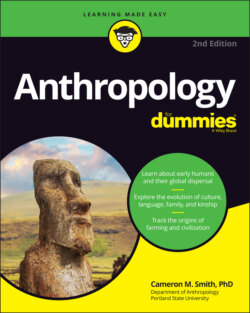Читать книгу Anthropology For Dummies - Cameron M. Smith - Страница 56
THE BOY WHO CRIED WHORF
ОглавлениеOne of the most fascinating and controversial concepts in linguistic anthropology is the Sapir-Whorf hypothesis, forwarded in the 1930s by linguists Edward Sapir and Benjamin Whorf. The two argued that language does as much to create human reality as it does to reflect the real world.
In 1940, Whorf wrote, “We dissect nature along lines laid down by our native languages. The categories and types that we isolate from the world of phenomena we do not find there because they stare every observer in the face; on the contrary, the world is presented in a kaleidoscopic flux of impressions which has to be organized by our minds — and this means largely by the linguistic systems by our minds. We cut nature up, organize it into concepts, and ascribe significances as we do, largely because we are parties to an agreement to organize it in this way — an agreement that holds throughout our speech community and is codified in the patterns of our language. The agreement is, of course, an implicit and unstated one, but its terms are absolutely obligatory; we cannot talk at all except by subscribing to the organization and classification of data which the agreement decrees.”
In other words, although an objective reality exists — jump off a cliff and you will die, whether you call it “flying” or “dying” — your impressions of that world are strongly shaped by the vocabulary you have to describe that world. For me, the lesson is to increase your vocabulary, and to learn other languages or at least words from other languages — you never know what new things you may find in the world.
